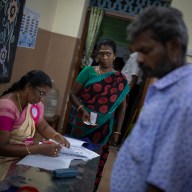nbc/universal photo
Tana Goertz, left, and Kendra Todd share a moment in reality show The Apprentice.
EVEN BETTER THAN THE REALITY THING: Everybody knows the dice is loaded, everybody knows the good guys lost, everybody knows that the boat is leaking, and everybody knows that reality TV is fixed.
It’s part of the unspoken agreement we make when we tune in to our favourite shows without questioning the staged premises, the theatrical challenges, the conspicuous edits and the elision around the banal, boring stretches that account for most of our very real days.
We all suspect that “reality” is being massaged heavily during any given reality TV show, and in our minds, we pan the camera around from some intimate but dramatically momentous moment to the camera crew leaning forward to capture the moment, and fast forward to the footage being spliced and scored for maximum effect.
What the critics of reality TV — if there are still any pounding that old, tattered drum — miss is how deeply reality TV engages the viewer, making the act of watching less passive than it’s ever been since the invention of the game show.
At the dawn of the game-show era, back in the age of crinoline skirts and flat-top haircuts, the industry was rocked by a series of game-show scandals, when it was discovered that producers had been coaching contestants to create more satisfying dramatic arcs for their shows, helping a popular contestant extend their winning streak for as long as viewers could sustain their enthusiasm. The industry was encouraged to police itself afterwards, but viewers learned to assume that there was more going on behind the scenes than they were shown.
When reality TV hit our screens nearly a decade ago, it was denounced as a fad, but when the fad seemed to have legs, the next wave of criticism took a tone of studied indignation, as critics pointed out that no one acted normally in front of a camera, that participants had agendas, and that there were huge staffs, including writers and editors, who worked to whip “reality” into shape for the cameras. The public reacted with a slow nod, a raised eyebrow and a shrug that proved, once again, that people are generally miles ahead of their self-appointed cultural “betters.”
This whole, complex dialogue between reality TV and its viewers is the subject of Be Real, which plays every Wednesday at 7 p.m. on TVtropolis. Host J.R. Digs takes his crew to towns like Perth, Guelph and Ottawa to ambush a willing bystander with an offer to star in their own reality TV show, then frantically prods and cajoles their day into TV-ready shape. Scenes are staged, conflicts created, and when the workaday banal is simply too big an obstacle to film around, it’s time for a montage sequence.
The fact that it airs on TVtropolis — Canwest Global’s channel for syndicated entertainment shows and classic TV reruns — is a grace note of complicity with the viewer; a reality TV show about reality TV, on a TV station devoted to TV: how much more goddamned meta can you get than that?
















